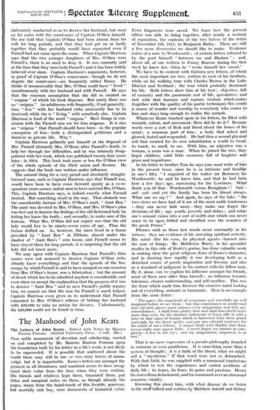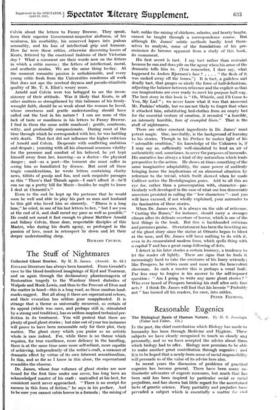The Manhood of John Keats
The Letters of John Keats. Edited with Notes by Maurice
Buxton Forman. (Oxford University Press. 2 vols. 36s.) This noble monument of devotion and scholarship, carried on and completed by Mr. Maurice Buxton Forman upon tile foundation built by his father in a life's work, is not likely to be superseded. • It is possible that scattered about the world there may still be one or two stray leaves of manu- script, but it is improbable. Keats's letters are amongst the greatest in all literatures, and mankind seems to have recog- nized their value from the time when they were written. His friends and relatives kept them, treasured them, put dates and marginal notes on them, as though already- the pages; warm' from the hand-touch of this lovable, generous, but mortally sick boy, were documents of historical value.
Even fragments were saved. We learn how the present editor was able to - bring • together, after nearly a century Of separation, the contents of the two halves of the letter of November 5th, -1817, to Benjamin Bailey. There arc still
a: few more discoveries we should like to make. Evidence exists of a note to Wordsworth ; of certain letters referred to by the poet himself " between me and Haslam " ; and, above all of one written to Fanny Brawne during the first week he knew her, when he " wrote himself her • vassal."
We have to be content with thirteen new letters, of which the most important are two, written to each of his brothers, While on his walking tour with Charles Brown in the Lake District and Scotland ; the tour which probably shortened his life. Both letters show him at his best ; objective, full of curiosity and the passionate zest of life, speculative, and rich with that humane and mature wisdom which makes (together with the quality of his poetic technique) this youth a source of wonder and worship to everybody who comes to
• him and stays long enough to realise the miracle. . Whatever Keats touched upon in his letters, he filled with warmth, colour, and movement. How did he do it ? Because Words were a sort of flesh and blood about the bones of his mind ; a sensuous part of him ; a body that ached and glowed, lusted and responded. He had thus a second physical self that created for its own inhabitation a world to tread, _ . to touch, to smell; to see. With -him,- an adjective was a woman, a noun was a man. • When he joined the two, thity begot children, solid little creatures full of laughter and
. grace and impudence. .1
In his letter to brother Tom he says (one must write of Min .
1 in the present tense, since e is so intimate and familiar in one's life), " I enquired of the waiter lat Bownoss) - Wordsworth—he said he knew him, and that he had been - here a few days ago, .canvassing for the Lowthers. Whit - think you bf that—Wordsworth versus Brotighani ! ! Sad sad—sad—and yet the family has been his friend always.
What can we say ? " And again, he says of the lake, " the two views we have had of it are of the most noble tenderness they can never fade away—they make one forget the divisions of life ;' age; youth, poverty and riches ; and refine one's sensual vision into a sort of north star which can never cease to be open lidded and steadfast over the wonders of the great Power."
Phrases such as thoSe last words recur constantly in his letters : they are evidence of his unresting spiritual activity. His mind—like his eyes, its physical agents—burned into the core of things. Mr. Middleton Murry, in his specialist studies in this side of Keats's genius, has done valuable work in making clear the great religious force of Keats's character, and in showing how rapidly it was developing both as a detached source of poetic inspiration and fervour, and also as a standard of judgment in his contact with his fellow men. By it, alone, can we explain his influence amongst his friends, most of them men older than himself ; an influence towards tolerance, clearer understanding, and self-sacrifice. This was the force which made him discover the creative mind looking out of everything, animate or inanimate. Here is an example from the same letter :
" The space, the magnitude of mountains and waterfalls are well imagined before we see them ; but this countenance or intellectual tone (of such places) must surpass every imagination and defy any remembrance. I shall learn poetry. hero and shall henceforth write more than ever, for the abstract endeavour of being able to add a mite to that mass of beauty which is harvested from these grand materials, by the finest spirits, and put into etherial existence for the relish of one's fellows. I cannot think with Hazlitt that these scenes make man appear little. I never forgot my stature so com- pletely—I live in the eye ; and my imagination, surpassed, is at rest."
That is no mere expression of a pseudo-philosophy founded in animism or even pantheism. It is something more than a system of thought ; it is a faith of the blood, what we might call a- " inysticiSm " if` that 'Word were - not so debauched. With that faith, he was supplied with a nournenal touchstone by which to test the experiences and varied accidents of daily life ; its hopes, its fears, its pains and passions. Hence his marvellous detachment, and his command over an abnormal sensuous vitality.
Knowing this about him, with what dismay do we listen to the stuff-talked and written by Matthew Arnold and Sidney
Colvin about the letters to Fanny Brawne. They speak, from their superior Government-inspector aloftness, of his weakness, his morbidity, his unnerved lapses into jealous sensuality, and his loss of intellectual grip and humour. How far were these critics, _otherwise discerning lovers of Keats, fettered by the emotional fashions of their Victorian day ? What a comment are their words now on the fetters in which a critic moves ; the fetters of intellectual, moral, and aesthetic modes. We see the same thing to-day. At the moment romantic passion is unfashionable, and every young critic fresh from the Universities condemns all work that does not ape the cerebral dryness and pseudo-ritualistic quality of Mr. T. S. Eliot's weary muse.
Arnold and Colvin were too befogged to see the incon- sistency of their attitude. Was it likely that Keats, in all other matters so strengthened by this talisman of his firmly- wrought faith, should be so weak about the woman he loved, whose sweetness- and gentle understanding should have called out the best in his nature ? I can see none of this lack of taste or manliness in his letters to Fanny Brawne. I find in them the same noble manhood ; gentle, courteous, witty, and profoundly compassionate. During most of the time through which he corresponded with her, he was battling with death. That fact did not influence the higher criticism of Arnold and Colvin. Desperate with conflicting ambition and despair ; yearning with all his abnormal sensuous vitality for the presence and comfort of his beloved, he yet kept himself away from her, knowing—as a doctor—the physical danger ; and—as a poet—the torment she must suffer in seeing him so humiliated by disease. But amid all these tragic considerations, he wrote letters containing chatty news, titbits of gossip and fun, and such exquisite passages as this " There's that Thrush again—I can't afford it—he'll run me up a pretty bill for Music—besides he ought to know I deal at Clementi's."
Even to the end he kept up the pretence that he would soon be well and able to play his part as man and husband to this girl who loved him so sincerely. " Illness is a long lane," he cried, in one of his last letters to her, " but I see you at the end of it, and shall mend my pace as well as possible." He could not mend it fast enough to please Matthew Arnold and Sidney Colvin, those dear, respectable disciples of this Master, who during his death agony, so prolonged in the passion of love, must in retrospect lie down and let their deeper understanding sleep.
RICHARD CHURCH.















































 Previous page
Previous page